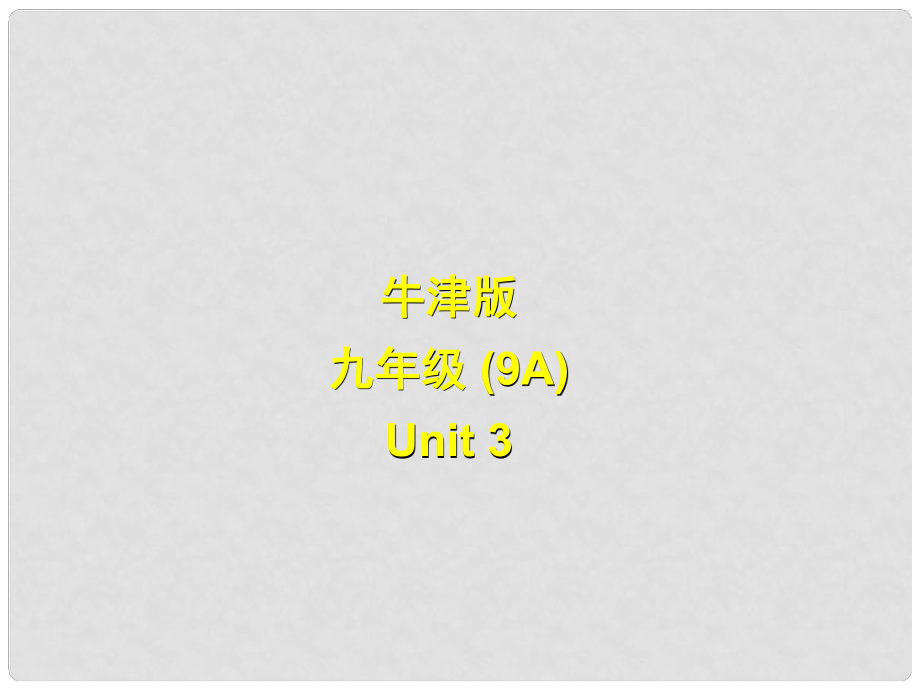《江蘇省永豐初級(jí)中學(xué)九年級(jí)英語上冊(cè)《Unit 3 Teenage problems》Grammar課件 牛津版》由會(huì)員分享,可在線閱讀�,更多相關(guān)《江蘇省永豐初級(jí)中學(xué)九年級(jí)英語上冊(cè)《Unit 3 Teenage problems》Grammar課件 牛津版(41頁珍藏版)》請(qǐng)?jiān)谘b配圖網(wǎng)上搜索�。
1、牛津版牛津版 九年級(jí)九年級(jí) (9A)Unit 31. I have a lot of homework to do every day.2. I want to refuse to do so much work.3. I hope to hear from you soon.4. My dream is to be a great football player.5. I believe it is important for us to spend some time on our hobbies.一�����、結(jié)構(gòu):一��、結(jié)構(gòu):1. 肯定式:肯定式:to + 動(dòng)詞原形動(dòng)詞原形 2. 否定式:否定式:
2、not + to + 動(dòng)詞原形動(dòng)詞原形 二���、用法:二、用法: 1. 作主語作主語(常用(常用 it 作形式主語)作形式主語)Its名詞名詞(for sb.)to do sth.和和Its形容詞形容詞(for/of sb.)to do sth. e.g. It is not easy to learn a foreign language.2. 作表語作表語 e.g. My dream is to be a famous singer.3. 作賓語作賓語“意愿企圖意愿企圖” (want/agree/decide/begin/like/afford/ plan/try) e.g. They beg
3、an to read. 4. 作賓補(bǔ)作賓補(bǔ)“命令忠告命令忠告” (tell/ask/want/wish/allow等感官動(dòng)詞和等感官動(dòng)詞和使役動(dòng)詞)使役動(dòng)詞) e.g. Jim asked me to help him with his lessons. 5. 作后置定語作后置定語 e.g. I have an important meeting to attend. 6. 作狀語作狀語(目的狀語目的狀語:come/go/live 原因狀語原因狀語:sorry/ glad/ surprised/ pleased/angry 結(jié)果狀語結(jié)果狀語:tooto/ enoughto) e.g. She
4���、went to see her grandma yesterday. 三�����、注意三�、注意1. 不帶不帶 to 的動(dòng)詞不定式的動(dòng)詞不定式 一感二聽三讓四看一感二聽三讓四看 feel, listen to, hear, let, make, have, see, watch, notice, observe; 感官動(dòng)詞和使役動(dòng)詞在被動(dòng)語態(tài)中�����,感官動(dòng)詞和使役動(dòng)詞在被動(dòng)語態(tài)中�����,其前要加上其前要加上to; 動(dòng)詞動(dòng)詞find與與help之后�,不定式可帶之后�����,不定式可帶to亦亦可不帶可不帶to。 e.g. Our teacher make us copy these words five times. We
5���、were made to copy these words five times by our teacher Jim helped (to) finish the work 2. 當(dāng)兩個(gè)不定式用當(dāng)兩個(gè)不定式用and連接時(shí)���,第二個(gè)連接時(shí),第二個(gè)不定式的不定式的to通常省略�。通常省略�����。 e.g. Simon likes staying out late to play football and chat with his friends.The Class 1, Grade 9 students are writing about their problems. Help them comple
6����、te the sentences with the correct forms of the verbs in brackets.1. My home is always noisy. I cannot find a quiet place _ (to study, studying).2. I have no courage _ (to share, for sharing) with my friends my worries.to studyto share3. To tell you the truth, sometimes I quarrel with my cousin Shirl
7����、ey. I hope she will not come _ (to disturb, disturbing) me any more.4. I hope my parents can spare some time for me every day. I need someone _ (talking, to talk) to at home.to disturbto talk5. _ (Learning, To learn) dancing well, I need much more practice.6. My parents care only about marks after e
8、xams. They do not seem _ (to notice, noticed) that I have tried my best.To learnto noticeFinish A2 on Page 50.Andy doesnt know what to wear.Tommy cant decide _.which book to buyThey dont know _ to the station.how to go常用的動(dòng)詞有常用的動(dòng)詞有: know/forget/decide/ask/explain/find out/hear/learn/ remember/see/tel
9���、l /understand + what/where/when/ which/who/how to wh-特殊疑問詞特殊疑問詞+to-infinitive相當(dāng)于一個(gè)相當(dāng)于一個(gè)名詞名詞,可以在句子中充當(dāng)賓語或主語可以在句子中充當(dāng)賓語或主語;做主做主語的時(shí)候語的時(shí)候,謂語動(dòng)詞是單數(shù)謂語動(dòng)詞是單數(shù);做賓語的時(shí)候做賓語的時(shí)候,它的前面動(dòng)詞常常有它的前面動(dòng)詞常常有: ask, decide, explain, find out, forget, hear, know, learn, remember, see, tell, understand等�。等��。疑難問答疑難問答問問:I dont know whe
10、n to start. 句中的句中的when是什么詞����,起什么作用�?是什么詞,起什么作用?答答:句中的句中的when是連接副詞。連接副詞不僅是連接副詞��。連接副詞不僅可以連接從句��,也可以連接動(dòng)詞不定式�。可以連接從句�����,也可以連接動(dòng)詞不定式。連接副詞后接動(dòng)詞不定式可以作連接副詞后接動(dòng)詞不定式可以作主語、賓語和表語等��。主語、賓語和表語等����。例如:例如:The problem is how to find such a man. (作表語)(作表語) 問題是如何找到一個(gè)這樣的人�。問題是如何找到一個(gè)這樣的人。 what when why where who how whose whom - content -
11�����、 time - reason -place - people - ways - belong to - people (object)wh- wordHOW WHICH WHAT WHEN WHERE 1. When I go into the clothes shop, I always cant decide _ one to buy.2. My grandfather doesnt know _ to use a computer.whichhow選詞填空選詞填空3. Will you please show me _ to drive a car? Yes, of course. No
12、w let me tell you _ to do first.4. I will tell Lucy _ and _ to meet. howwhatwhenwhere把下列句子改成簡(jiǎn)單句。把下列句子改成簡(jiǎn)單句。 1. The old lady found out where she could buy fruit cheaply. The old lady found out _ fruit cheaply.where to buy 2. Will you show us how we can make a model plane? Will you show us _ a model p
13��、lane?how to make3. She hasnt told me what I should do and what I should not do. She hasnt told me _ and what _.4. Have you decided which dress you will take? Have you decided _ dress _?what to donot to doto takewhichFinish the exercise on Page 51.一�����、按使用目的一���、按使用目的, 句子可分為陳述句���、疑句子可分為陳述句、疑 問句��、祈使句和感嘆句���。問句��、祈使
14、句和感嘆句����。1. 陳述句陳述句(Statements):說明一個(gè)事實(shí)或:說明一個(gè)事實(shí)或陳述一種看法���。陳述一種看法��。 1) 肯定式肯定式 (Positive statements) Jack is watching TV. 2) 否定式否定式 (Negative statements) Jack is not watching TV.2. 疑問句疑問句(Questions): 提出問題�����。提出問題�。 1) Yes / No questions 用用Yes或或 No 回答的疑問句回答的疑問句 Is Jack watching TV? Yes, he is. / No, he isnt. 2) 特殊疑
15、問句特殊疑問句(Wh-Questions): Where do you live?3) 選擇疑問句選擇疑問句(Questions with or) 提出兩種或兩種以上的情況�,要求對(duì)提出兩種或兩種以上的情況,要求對(duì)方選擇一種方選擇一種結(jié)構(gòu)結(jié)構(gòu): 一般疑問句一般疑問句 or + 一般疑問句一般疑問句 Do you want tea or coffee? 4) 反意疑問句反意疑問句(Tag questions): He doesnt know her, does he? 3. 祈使句祈使句(Imperative Sentences): 提出提出請(qǐng)求請(qǐng)求,建議或發(fā)出命令���。建議或發(fā)出命令���。 Dont b
16、e nervous!別緊張�!別緊張!4. 感嘆句感嘆句(Exclamatory Sentences):表示表示說話人驚奇�����、喜悅��、憤怒等情緒���。說話人驚奇��、喜悅���、憤怒等情緒��。 What good news it is!多好的消息?�?����!多好的消息?�?!二����、句子按其結(jié)構(gòu)可以分為以下三類:二、句子按其結(jié)構(gòu)可以分為以下三類:1) 簡(jiǎn)單句簡(jiǎn)單句(Simple Sentences):只包含只包含一個(gè)主謂結(jié)構(gòu)句子叫簡(jiǎn)單句��。一個(gè)主謂結(jié)構(gòu)句子叫簡(jiǎn)單句�。 She is fond of collecting stamps. 她喜歡集郵。她喜歡集郵��。2) 并列句并列句(Compound Sentences):包含兩包含兩個(gè)或
17�、兩個(gè)以上主謂結(jié)構(gòu)的句子叫并列個(gè)或兩個(gè)以上主謂結(jié)構(gòu)的句子叫并列句,句與句之間通常用并列連詞或分句�����,句與句之間通常用并列連詞或分號(hào)來連接�����。號(hào)來連接。 The food was good, but he had little appetite. 食物很精美食物很精美, 但他卻沒什么胃口�。但他卻沒什么胃口。3) 復(fù)合句復(fù)合句(Complex Sentences): 包含一包含一個(gè)主句和一個(gè)或幾個(gè)從句的句子叫復(fù)個(gè)主句和一個(gè)或幾個(gè)從句的句子叫復(fù)合句合句, 從句由從屬連詞引導(dǎo)�。從句由從屬連詞引導(dǎo)�����。 The film had begun when we got to the cinema. 我們到達(dá)電影院的時(shí)
18�、候我們到達(dá)電影院的時(shí)候,電影已經(jīng)開演電影已經(jīng)開演了。了��。根據(jù)不同標(biāo)準(zhǔn)根據(jù)不同標(biāo)準(zhǔn), 判斷下列句子的類型����。判斷下列句子的類型。1. I can see a pear and an apple on the table. 2. There is an “f” and a “u” in the word “full”.3. Is his sister an eight-year-old girl?4. Kate has a new computer. 5. Great! 6. Whats five and one? 7. We have gone to school five times.8. Ha
19�、n Meimei is in row one. 9. Do you know that man or this man?10. There is a pencil and two erasers in the pencil-box. 11. I have one bike, but he has two. 12. Boys and girls, come and have a rest.13. Why dont you put on your jeans? 14. What a doctor!15. They are drivers. Finish the exercises on Page 53.
 江蘇省永豐初級(jí)中學(xué)九年級(jí)英語上冊(cè)《Unit 3 Teenage problems》Grammar課件 牛津版
江蘇省永豐初級(jí)中學(xué)九年級(jí)英語上冊(cè)《Unit 3 Teenage problems》Grammar課件 牛津版

